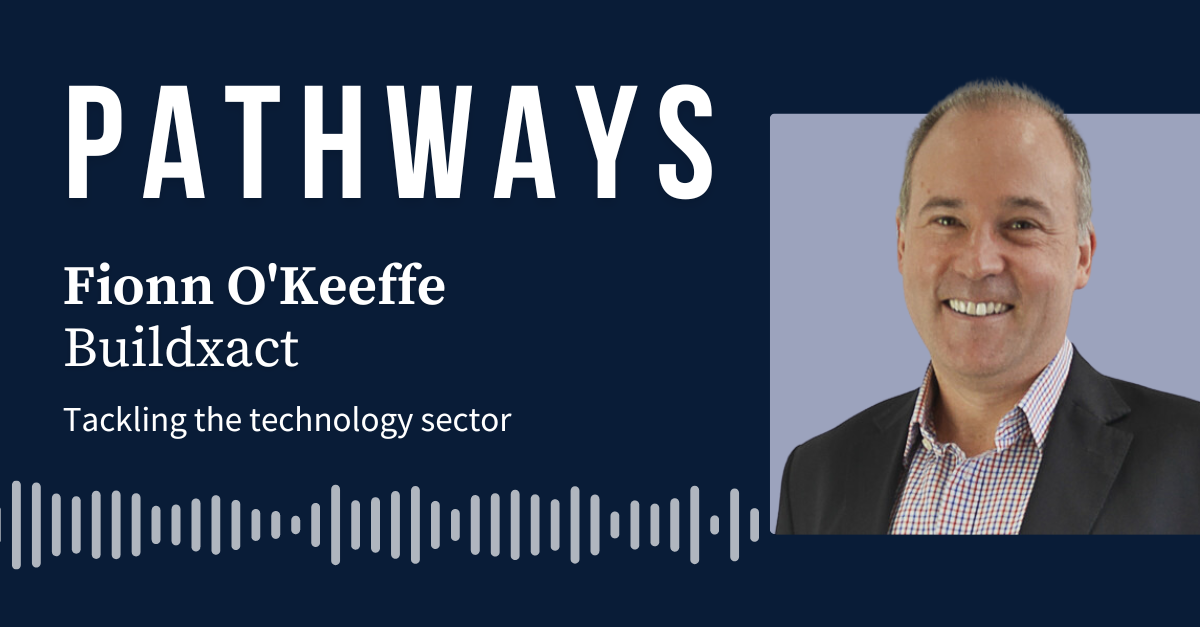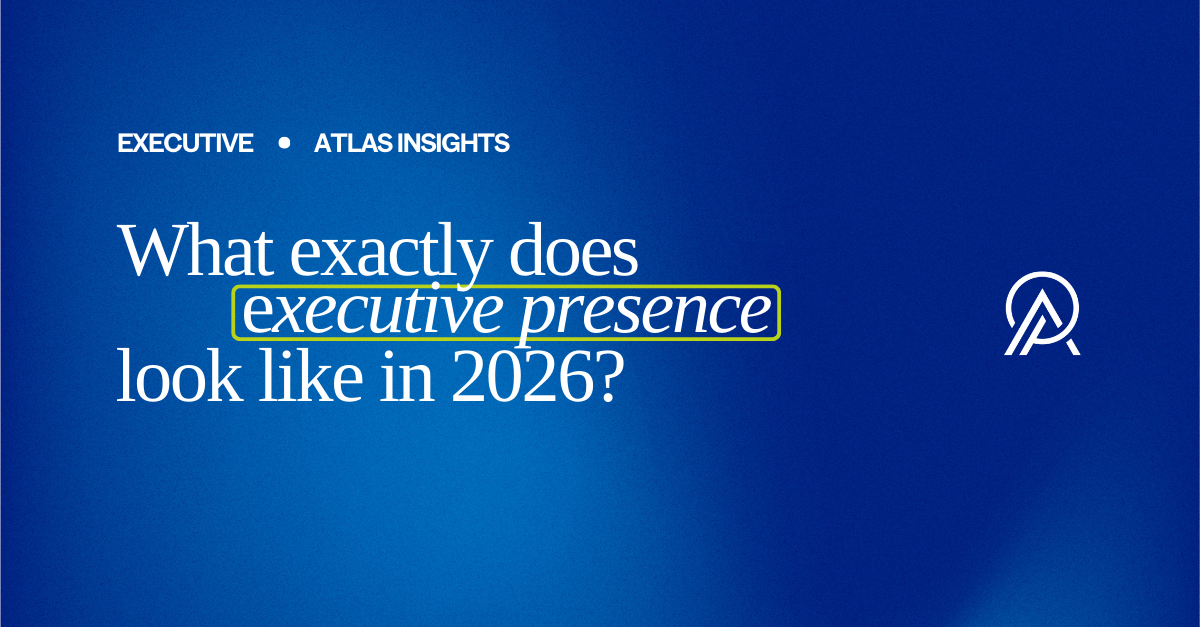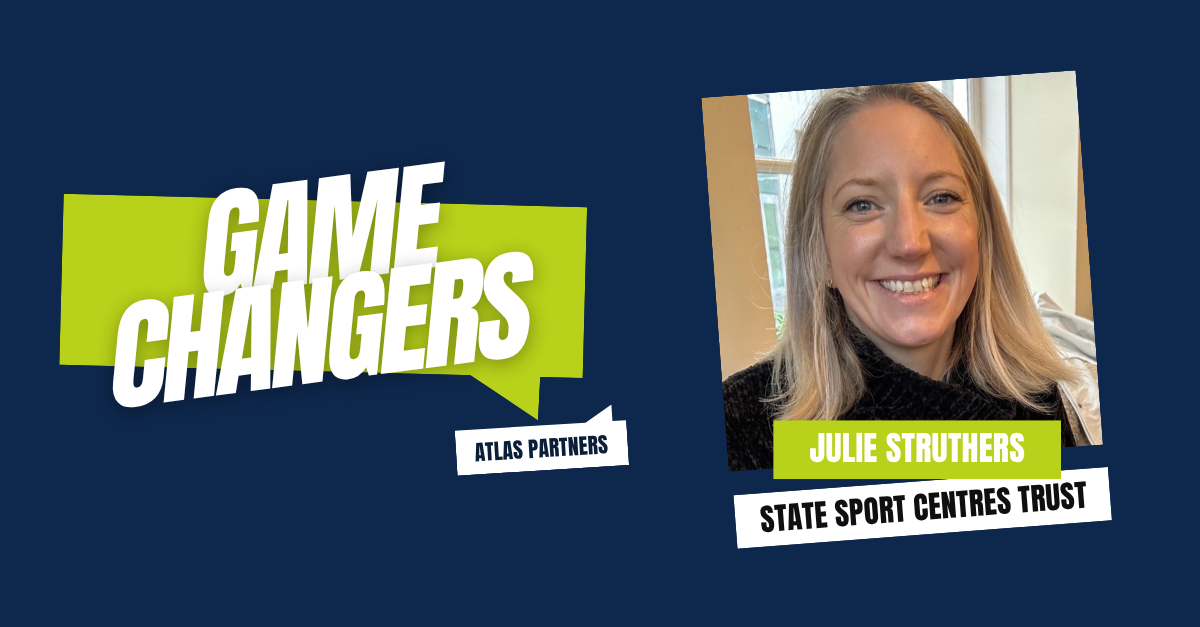Pathways — Fionn O’Keeffe, Buildxact
A career move into the property tech industry right before the 2008 economic crisis, would prove to be the best bad decision of Fionn O’Keeffe’s career. Though the GFC would dry up the property market overnight, the experience not only thrust Fionn into the growing tech industry, it taught him some of his greatest leadership lessons that set him off on a tremendous path.
Craig Gorton, Director of Atlas Partners, takes time to walk through the journey with Fionn O’Keeffe, CFO of Buildxact. We discuss the journey and key learnings along the way.
Craig Gorton: Could you start by talking us through your career, including the early days and your foundational learnings?
Fionn O’Keeffe: Thanks, Craig. Thanks for giving me this opportunity. My career started a bit differently to many others as I was at KPMG in Malaysia in the early 1990s with Australia in a recession at the time. So I was fortunate to have a role at KPMG in Malaysia and I was happy to be there as I had grown up in Singapore & Malaysia since moving there with my family in the mid 70’s…I was an expat kid. My parents were still in KL at the time so it worked well for me. I stayed with KPMG Malaysia for about five years and completed my professional qualifications. KPMG Malaysia was quite different from KPMG in Australia. It had a diverse environment with lots of different cultures and people, which taught me to understand and appreciate various backgrounds.
One key learning was understanding ethnic diversity within an organisation. This is something I’ve carried throughout my career, appreciating and understanding people from different environments.
After about five or six years, I moved to a different organisation working on a hydroelectric project in southern Laos. We had a concession to build and develop a hydro project and sell electricity to Thailand. Unfortunately, the Asian economic crisis in the late 1990s brought that to a halt.
By 2001, I was back in Australia, needing to reinvent myself. My Asian experience wasn’t highly recognised, so I started consulting businesses and leveraging my network to gain Australian experience. My first job in Australia involved unpacking boxes in the morning and doing the books in the afternoon for a friend’s business.
Fortunately, I landed my first real job in Australia with a company called Remunerator, which was the second largest salary sacrifice provider in Australia at the time. Our customers included the South Australian government and the NSW Health Network. I started as a senior finance manager and eventually became the CFO. The executive suite had about eight or nine people, and by the time I left, there were three, with me taking on many roles. It was a family-owned business run by Matthew Honan, a good boss, but I knew my growth opportunities were limited, so I sought opportunities elsewhere after a few years.
My first role in the technology sector was with Majitek Pty Ltd (Now Urbanise Limited on the ASX), in the connected real estate industry. This was my entry into the tech business, developing software for the Dubai property market. However, the 2008 economic crisis hit, and the market for our software disappeared overnight. We had raised money from Cisco and were ready to launch, but the market collapse forced us to restructure significantly. It was my introduction to being a CFO during an economic crisis, making tough choices about resourcing and communicating with the board and senior managers.
This experience taught me the importance of having clear objectives, understanding available resources, and making informed decisions. Effective communication with directors, C-Suite managers, and downstream teams is crucial.
After leaving that organisation, I joined Whispir, run by Jeremy Wells and Romilly Blackburn. Whispir was scaling up, relying on R&D refunds and grants from Innovation Australia. We expanded into Singapore and the US, raising capital multiple times. This reinforced the importance of communicating the context behind numbers.
After Whisper, I moved to PeopleStreme, another tech business in the HCM industry. My role was to help them raise money or find a partner for the business growth. This mandate involved significant change management and communication. As part of this process we had to completely overhaul the sales management and finance systems in place, a complete reboot to enable us to scale. This was a complex task but we were successful as we sold PeopleStreme to Ascender, part of the Potential Capital Group, providing them with an HCM platform. I became the group financial controller at Ascender, a $150 million business, managing a larger team across different locations during COVID.
My best mentor was the CFO at Ascender, Neil Thompson, who taught me, amongst other things, to earn respect through actions. Respect comes from delivering on your promises and leading by example.
After a couple of years I left Ascender and joined ASX listed Optima Technologies Limited (formerly Bid Identity Limited) as CFO. Optima was a technology business which operations in the US and we closed on an acquisition in the UK 3 days after I started. I was able to leverage skills and experience in managing teams in remote locations and post acquisition integration. Unfortunately we did not quite have product market fit for our technology in the US and our performance was not what we would have liked. Whilst the business undertook a restructuring under a new CEO I was fortunate to to offered a new role at Kepler Analytics.
Kepler Analytics, was an Australian tech business with global ambitions. When I joined they were well down the path of an acquisition in the US which we completed a few months after I started. Although still founder led at the time there were some misaligned expectations associated with the acquisition that led to challenges.
My time at Kepler reinforced for me the importance of a clear plan, organisational structure, ensuring the right management processes and the need for business to have good working relationships at all levels of an organisation. I left after a year and a half and joined Buildxact, where I am today.
Buildxact is an organisations that possesses the attributes for a successful business, and to name just a few… A clear plan and understanding of its ICP & PMF, data driven decision making with a focus on the metrics and good leadership at all levels providing management and teams with the autonomy to succeed. Importantly there is trust and confidence within and between teams and individuals allowing them to rise to the occasion and deliver.
Craig Gorton: Excellent. Thank you, Fionn. That’s quite a journey. I’d be really interested to explore your journey into the tech sector a little bit further. What attracted you to this sector? And was it what you expected?
Fionn O’Keeffe: I joined the tech sector when I joined Urbanise.
I didn’t necessarily pursue the tech sector initially, but it’s where I’ve ended up. One of the things that attracted me is the agile environment. It’s a space with constant changes, where products are being developed, markets are being explored, and partnerships are being formed. I’ve tended to work for founder-led businesses, which just happened to be in the tech space. These agile environments, typically founder-led, have a bit of uncertainty which keeps things interesting. It’s not like working for Telstra or BHP, where life is probably more predictable; it’s more unpredictable and edgy.
There’s a lot more work to be done and immature processes to improve. I enjoy the opportunity to come into a business and make a mark, rather than just follow someone else’s work. These businesses tend to have high growth aspirations, often based in Australia but expanding overseas, which also attracts me. That’s exactly what I have at Buildxact.
Craig Gorton: Excellent. In your view, what does the future of a CFO in the technology sector look like in terms of challenges and opportunities?
Fionn O’Keeffe: There are plenty of opportunities at the moment. We’re all getting on top of this wave called AI, understanding its impact, risks, and significant opportunities. For CFOs, AI can make jobs easier, especially for staff, allowing teams to focus on more value-added tasks like analysis and decision-making. Finance teams should provide information to help the business make good decisions, and leveraging AI is crucial in performing that function.
There’s a lot of talk about whether there will be a need for accountants and CFOs in the next 10-20 years. I think there always will be, but the role might evolve. We need to adapt to the tools available to us and expand the scope and function of the role with AI.
Craig Gorton: What would you say are the top lessons you’ve learned as a CFO?
Fionn O’Keeffe: One of the most important skills is the ability to communicate. Numbers are just numbers until they are communicated well in terms of their meaning and the message you’re trying to convey. Communication is crucial.
Team management and people management are also vital. CFOs don’t do all the work; they have a team. It’s important to manage people effectively, ensuring they understand the journey and goals, which makes for a better team dynamic. Building trust among your team and those you report to is key. These are three significant lessons I’ve learned and continue to focus on.
Craig Gorton: Excellent. Thank you. Switching gears slightly, let’s discuss mentors. Have you had any particularly good mentors or anyone who had a strong impact on your career?
Fionn O’Keeffe: I’ve had good people I’ve worked for and with. By virtue of the size of businesses I’ve worked for, I’ve tended not to work under other CFOs or finance leaders. It’s more about the experience of working with and alongside people. There are people whose skills and attributes I’ve learned from and others whose traits I’ve consciously avoided. You can take the good and ignore the bad.
Craig Gorton: Any advice for future leaders who may be reading this?
Fionn O’Keeffe: I think developing good communication skills is crucial, whether verbal, written, or illustrative. Being able to communicate your message well and effectively will always be beneficial. The ability to communicate an idea concisely and precisely is essential for future success.
For future CFOs, while understanding the technical side is a given, communication is what will set you apart. When you present, do you command the respect of the room? This often comes down to body language, the way you speak, and how you present yourself. It’s an important skill to consider.
Craig Gorton: Excellent. Great advice. Finally, a glimpse into your personality. What’s your favourite book and why?
Fionn O’Keeffe: I enjoy two types of books. When I’m on the beach or by the pool, I like escapism, such as spy or crime dramas. At other times, I enjoy topical books, like those on Russian corruption or politics. I also enjoy biographies of people with admirable skill sets and attributes.
When I do get a chance to read, it’s often for escapism. Any book that takes your mind away from work is good because we need downtime. In this day and age, work is only ever a phone call or text away, so it’s good to relax and let your mind wander.
Craig Gorton: Thank you for joining us today. Your advice on the topics covered has been incredibly useful. Thank you.
Fionn O’Keeffe: My pleasure.





